- Home
- Iain Pears
The Immaculate Deception ja-7 Page 11
The Immaculate Deception ja-7 Read online
Page 11
The signs of activity were all around; from the other side of the house came the unmistakable sounds of children playing, screaming with laughter amid the splashing of water; two hens strutted neurotically around, their beady eyes fixed on the ground, intent on spotting every last fleck of food; a cat slept peacefully nearby, ignoring everything. From inside came the sound of a woman singing to herself—obviously to herself, as no one would ever dare sing that badly in anybody else's hearing. The house had all the signs of poor owners, of making do, of there being little luxury. Flavia felt an enormous and uncontrollable surge of longing. Some people make comfort and contentment wherever they are, whatever their circumstances. This house was created by one of those people. Her surprise was as great as her envy.
The singing stopped abruptly when she knocked; there was a long pause, then a woman in her late forties came to the open door, drying her hands as she walked.
She even had a pleasant face, this terrorist ideologue. She had once been striking.
Now the face was getting old, careworn with tiredness. But again, there was an ease and a contentment there that came from a deeper place.
"Elena Fortini?" Flavia asked. "May I have a word with you, please?”
There was instant suspicion, but no fear or uncertainty in the response. "Secret police come to check on my bomb-making factory, are you? Come in, then.”
Flavia stepped over the threshold, into the warm hospitality and the domesticity of others. "Police, but not very secret," she said. "I'd like to see the bomb-making factory, though. I love these country pursuits.”
Elena eyed her carefully, paused a second, then let out a laugh. "Later, if you want.”
She led the way to the huge stone-floored room that served as kitchen, workroom, laundry room, dining room, and sitting room. In one corner a television, in another a piano jammed up against a washing machine so old it should have been in a museum.
Surrounding it was so much washing that Flavia felt a pang of sympathy for the machine.
"Dirty things, children," Elena said. "I live my life cocooned in washing.”
"How many do you have?”
"Two. I know; you thought there must be at least eight to produce this mess. But two is quite enough to reduce anything to rubble. I have a vague image of tidiness I keep in my mind, rather like some people have a notion of eternity in paradise. You never approach it, but it's good to believe that you might get there one day.”
She gestured for Flavia to sit down at the table while she poured some coffee. "The English maintain that old age begins when the police start looking young," she commented.
"Sounds like a compliment to me," Flavia said. "I feel anything but young at the moment.”
Elena peered at her carefully, then nodded. "I'm not surprised," she said elliptically.
"I suppose if I told you to go away, it wouldn't do any good.”
"Sorry, no. But I don't think I'll take up much time. We don't bother you much, do we?”
"More than you should. It's not as if I ever have anything new to say to you, after all.”
"Maybe this time you will. I'm here to ask you about more recent events. In the last month.”
"I've scarcely been out of the house in the last month.”
"Visitors?”
"I don't encourage them.”
"Phone calls?”
"No phone.”
"Letters?”
"Only bills. Listen, why don't you ask proper questions? Then I might be able to answer more usefully.”
"Very well. Maurizio Sabbatini.”
Elena rolled her eyes. "I might have known. What's the old faker been up to now?”
"He's dead, for one thing.”
She grimaced. "So I heard." She rubbed her nose for a few seconds and concentrated hard, so it seemed, to keep the tears out of her eyes. "He was a complete fraud, you know. A faker in everything he thought and said and did. He had the sincerity of a beetle, and the constancy of an earthworm. I hadn't seen him for ten years, never wanted to see him again, and I'm very upset he's dead. Can you explain that?”
"Part of your past goes with him?”
"Glib and facile.”
"Yes, but I don't know anything about either of you. Glib and facile is all I can manage.”
"He was fun. Always laughing. Even when he robbed a bank, he thought it an absolute hoot. And made everyone else laugh as well. He even had the bank manager in stitches before he left. He used to come to collective meetings, when everyone was earnestly discussing the dictatorship of the proletariat, and within half an hour had everybody giggling hysterically. He could never take anything seriously.”
"So why didn't you want to see him again?”
"Life is not a laugh. Some things are too serious.”
There was a lot, a whole world, unsaid here. Flavia waited, hoping she would volunteer the information, but instead she just looked up at her. "And he's dead, and you're here. Perhaps you'd better tell me why?”
"I was hoping you'd tell me.”
"Maybe I can. Maybe I will. But you can hardly expect me to pour out my soul to some policewoman who just walks in my door one day. I don't know who you are or what you want. Anything I say you'll have to earn. Don't you think that's fair?”
It wasn't. She was a convicted criminal, Flavia was police. She should answer all questions put to her. In theory. Flavia realized quite well that this was not the right approach. Elena Fortini, she knew, had withstood more seasoned, more brutal interrogators than she would ever be. Anything she wanted that this woman knew would have to be given up freely or not at all.
"Earn how?”
"By telling me why you're interested in such a wastrel. Tell me about my poor old clown. Then maybe I will tell you about him myself. It's not as if you can do him any harm, and not as if I'd care much even if you could.”
So Flavia told her a little: about the theft of the painting, how someone else had swapped the picture for the ransom, how Sabbatini was already dead by then. No details, just an outline.
"Was there an autopsy? Was he drunk?”
"Fairly drunk. Not gigantically so, though. Not to induce a stupor, I would have thought. But enough to make him fall asleep and stay asleep as he drowned.”
"You've considered the possibility that he was held under until he drowned?”
Flavia hadn't. Indeed, the idea had never crossed her mind, so easy had it been to summon up an image of a dissipated, irresponsible fake artist incapable even of staying awake in a bath. So she reconsidered quickly.
"If it was the case, then it is likely to go down as the perfect murder. No one saw, heard, or suspected anything. There is not the slightest shred of evidence.”
She nodded. "Just like last time, then.”
Flavia raised an eyebrow.
"His sister," she explained.
"Ah. That I know about.”
Elena looked closely at her. "I wonder why," she said.
"Tell me about it, though. I don't know many of the details," Flavia prompted.
"Find them yourself. It's all in the file, isn't it? Young innocent murdered by ruthless terrorists?”
"Is that why you stopped? If I remember, she was killed in 1981, you gave yourself up soon afterward.”
She shrugged. "My womanly instincts revolted, is that what you think? No; I gave up because I hate lost causes. No other reason. Besides, I thought you were here to discuss the present, not the past.”
"I'm here to discuss Sabbatini.”
"Maurizio was a joker, unreliable, untrustworthy. He doted on his sister, and when he was picked up by the police, she was kidnapped to warn him to keep his mouth closed.
Then she was killed. He never quite recovered from it; he felt responsible, which he was. He stopped laughing. Is that good enough for you?”
Flavia got up and poured herself another coffee without asking. It was very strange how she felt at home here, companionable with this incomprehensible woman, so sweet and gentle,
and with such a past. Flavia over the years had come to trust her feelings for people; if she felt comfortable with them, it usually meant they were trustworthy, even pleasant. This time her feelings and what she had just heard were so mismatched that nothing was making sense.
"So how did you get here?”
"I retired," she said with a faint smile. "I couldn't take it anymore. There were only two ways to go: ever more violence in a cause that was becoming hopeless, or getting out. I got out; others chose a different course.”
"And Maurizio?”
"You know as much as I do. It has struck you, I suppose, that the theft of this painting mirrors his past antics? That he advertised himself so that it must have been clear—to some people if not to you—who was responsible?”
Flavia nodded. "And the money?”
"Maurizio was never interested in money.”
Flavia shook her head. "I'm out of my depth here. I can't even begin to see the logic of this. I'm used to people doing things for simple reasons, even good reasons. Wanting more money is the main one.”
Elena shrugged. She got up, peered through the window into the sunlight where the children were playing, and began to tidy the kitchen. She had said her piece.
"You asked, I answered. Nothing more I can say. But the idea that Maurizio was after money doesn't work. Nor does the idea that he was working with someone. He never did in the past, not even with me. He trusted absolutely no one. No friends, no colleagues. And you are telling me that he suddenly got himself an accomplice and suddenly became interested in money. Very unlikely. But," she said as she walked Flavia back to the car, "you must make up your own mind. Tell me one thing, though,"
she said as she watched Flavia open the door and prepare to leave.
"Yes?”
"Boy or girl?”
Flavia frowned in puzzlement. "What?”
"The baby. Is it a boy or a girl?”
14
As far as Argyll was concerned, Flavia had merely gone off on a routine expedition and would be back, that day or the next, when she had finished. There was no need to hang about waiting for her when there were things to be done. And many of the things that were to be done were proving rather difficult. He rang his old employer in London to see if there were any papers about the Finzi collection around, but was told what he already suspected, that they had all been left to Tancred Bulovius. He decided not to explain why he didn't feel it right to try and look at them just now. So he asked for a list of the Finzi paintings bequeathed to the London National Gallery instead, just to get a feel for the man's tastes.
And he gave a summary of his conversation with Bulovius, to see if Byrnes had any suggestions.
"This picture I told you about. Bulovius said it was hugely important, but I couldn't get the old buffer to come clean. Unless I can get some sort of hint...”
"No one else has ever seen anything in it?”
"Not many people have ever looked at it. Not in the last half century, anyway.
Bulovius said it was obvious when you looked at it, but it wasn't to me. What do you think?”
"Possible," Byrnes said. "He was immensely knowledgeable. Unfortunately, he never published much, or wrote much down.”
Argyll groaned.
"And," Byrnes went on to make things worse, "there aren't many people who knew as much as he did. He had an uncommonly good eye. His say-so would mean a lot.”
Argyll ground his teeth.
"You're being very noisy," Byrnes said disapprovingly.
"It reflects my sense of frustration. I suspect I am dealing with one of the most important pictures I have ever come across, but I don't know what it is, and can't find out.”
"I'll have a look if you like. See if anything springs to mind.”
"Thank you. But unless I get a handle on Bulovius's proof, it's still all opinion.
Damnation.”
"What?”
"Nothing." Argyll thanked him and put the phone down, cursed for a bit and then did some more phoning. And then he, too, packed an overnight bag and, as Flavia had taken the car, headed for the railway station.
It was premature of him; he arrived far too late to do anything of use, and had to spend the evening wandering about Florence killing time and grumbling about the unnecessary expense of a hotel room for the night when he could have been at home in bed. But the idea of Florence had appealed, and by the time he realized it wasn't such a good one it was too late.
Once upon a time, and not very long ago, he would have considered few things nicer than spending an evening in Florence, all alone, not doing very much. He'd spent much of his life, certainly many of the enjoyable parts of it, doing something similar in several dozen cities across Europe. But he had noticed that the charms of solitude were beginning to pall a bit. He got lonely more easily and more quickly. He missed someone to talk to. He found his own company at a table in a restaurant a bit tedious. He went to bed early, and read the copy of Vasari's Lives he had brought with him.
He was still feeling slightly disconcerted by the failure of old pleasures when he got up the next morning and walked over to the Church of San Pietro that Bulovius had mentioned. No help there. Then he hired a car (another unnecessary expense) and struggled through the morning traffic to Fiesole. And here it all came together. Of course it did. The Church of San Francesco was a Franciscan church. And there, in a prominent place, was a version of the Immaculate Conception—again with atypical imagery, not the same at all but fitting what he was looking for.
Out came the Vasari, and there, plain as a pikestaff once you knew where to look, was the reference to un nostro donna con figure, which in 1550 was in the Church of San Pietro. And it wasn't there anymore. No one had ever heard of it.
He went and found an agreeable seat overlooking Florence, and thought about it. It wasn't conclusive; all it did was demonstrate what Bulovius thought the picture was. But now that he had a name, he could follow up at the Uffizi and check the drawing Bulovius had mentioned. Then he'd be close.
His head still spinning, he got back in his car and drove northward. His destination was Poggio di Amoretta, a hamlet more than a village, perched on top of a hill fifteen kilometers outside Florence, and about three from the Villa Buonaterra. It took rather longer than it should have to get there, partly because of the traffic, but more because Argyll got lost, and then stopped minding; it is hard to keep your mind on business when you find yourself in the wrong village, squashed in a tiny square facing the unfinished facade of a Romanesque church with a door beckoningly open— come in and see—together with a minuscule restaurant with an aged waiter hopefully setting out clean, pressed table linen for diners who seemed unlikely to show up.
Argyll's mood was restored in an instant. It was eleven forty-five, and May. It was warm, but the air still had none of the harshness of afternoon. Apart from the waiter, there was no sound at all; Argyll could even hear the reassuring rumble of a tractor from way over the next hill. The vines were neat, ordered, trimmed, and ready to do their best. There was no choice really. What was the point of being in Italy unless you took advantage of such things? And, for only the second time in more than a decade, as he breathed in the clean, fresh air, he thought that life in Rome was, perhaps, not so perfect after all. That there were disadvantages; that the noise, the smell, and the crowds were not so completely trumped by the pleasures of the place.
He got out of the car, nodded amiably at the waiter, discovered that there would be no food for another half hour at least, then puttered into the church, coming out twenty minutes later with his air of relaxed contentment perfectly reestablished. A lovely little thing, delightful altarpiece, and some handsome sculpture. As usual, he thought wistfully that, had he really been lucky, he would have been born a Tuscan master mason, around about 1280. The best possible job in the most civilized of all periods.
Must be nice to build a church.
A glass of cool fine wine, some homemade pasta, a little piece of veal
, and two coffees erased any remaining sense of urgency. He chatted with the waiter—who had little else to do—then to the waiter's wife, who had made the pasta and cooked the meal. Then he just sat and watched and listened. A goat walked past. It was very interesting.
He didn't really fall asleep, just dozed a little, but it was formidably difficult to get up, and he did so only when the clock on the church tower struck a halfhearted two o'clock.
He looked at his watch. It was quarter past. Disaster. He went inside, found the phone and called Flavia to say he'd be late. No answer, so he left a message. Then he stretched, ambled back to his car and drove the remaining kilometer to Poggio di Amoretta.
The reasoning that brought him there was more or less sound, in theory: he had finally got hold of someone in Weller, the Norfolk village where Mary Verney lived, who had some idea where she was. Not in England; in fact, he was told that she was at her house in Tuscany. Where this house was, unfortunately, was unknown. But here he was, nevertheless, simply on the basis of Stonehouse's memory that at the time of the Buonaterra robbery she had been mainly staying in the village of Poggio di Amoretta, and on her own recent statement that she wanted to come and stay in a house she owned.
And this is where Argyll came, long shot though it was. But, as he kept on telling himself, the reasoning was not entirely stupid; it was based more on what he considered to be a profound knowledge of Mary Verney's character and common sense.
Besides which, she had to have lived somewhere before she inherited the great pile in Norfolk—prematurely, and only by murdering its previous occupant, admittedly—and her Italian was so perfect that long years of residence in the country could be assumed.
A fine, indeed an elegant, piece of reasoning of which he was inordinately proud. On top of it, of course (although he played this down in his mind so as to heighten the satisfaction produced by the contemplation of his deductive powers), was the fact that a Signora Maria Verney was listed in the phone book.

 The Dream of Scipio
The Dream of Scipio Stone's Fall
Stone's Fall The Last Judgement
The Last Judgement An Instance of the Fingerpost
An Instance of the Fingerpost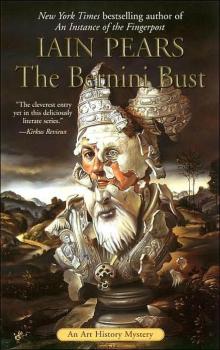 The Bernini Bust
The Bernini Bust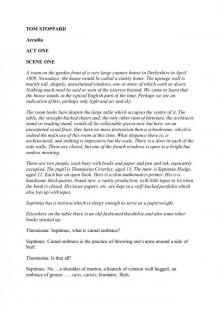 Arcadia
Arcadia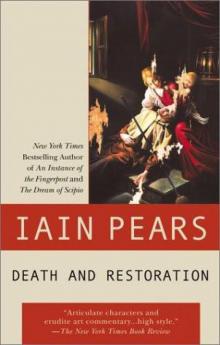 Death and Restoration
Death and Restoration The Raphael Affair
The Raphael Affair The Titian Committee
The Titian Committee The Immaculate Deception
The Immaculate Deception Giotto's hand
Giotto's hand The Portrait
The Portrait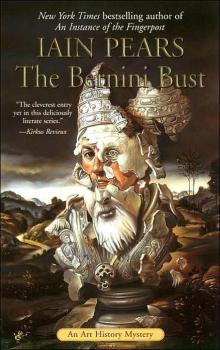 The Bernini Bust ja-3
The Bernini Bust ja-3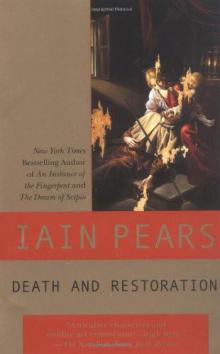 Death & Restoration ja-6
Death & Restoration ja-6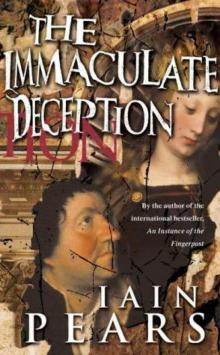 The Immaculate Deception ja-7
The Immaculate Deception ja-7